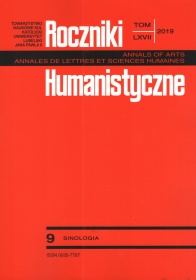Development and Basic Assumptions of Ancient Chinese Thought
Abstract
The article was written in order to familiarize the reader with the genesis, development and basic assumptions of ancient Chinese philosophy. The first part presents the external and internal conditions that influenced the intense development of ideas in the Middle Kingdom in the period preceding the creation of the authoritarian Qin Empire in 221 BC. The second and third parts discusse the general assumptions of the most important philosophical schools, focusing in the third part on a detailed discussion of the main topic of Chinese philosophy, which is the retention of the social order, in the four main schools of thought: Confucianism, Legism, Mohism and Daoism. The main research method was the analysis of Chinese classical texts, carried out on the basis of the author’s own translations, which enabled deeper penetration into the raised issues. As a result, it was established that the philosophy of ancient China is above all a political philosophy, which results from the declared pragmatism of Chinese thinkers. The author compares selected aspects of Chinese thought with the West European thought, which allows partial reconciliation of both perspectives and makes it easier for the Western reader to approach the understanding of the far-eastern view of reality.
References
Ames, Roger T. The Art of Rulership: A Study of Ancient Chinese Political Thought. Albany: State University of New York Press, 1994.
[Baza chińskich tekstów klasycznych:] Chinese Text Project. Dostęp 1 lipca 2018. Ctext.org.
Creel, Herrlee Glessner. Chinese Thought, from Confucius to Mao Tse-tung. Chicago: University of Chicago Press, 1953.
JeeLoo Liu. Wprowadzenie do filozofii chińskiej: Od myśli starożytnej do chińskiego buddyzmu. Przełożył Mieczysław Godyń. Seria: Ex Oriente. Kraków: Wydawnictwo Uniwersytetu Jagiellońskiego, 2010.
Kołakowski, Leszek. Czas ciekawy, czas niespokojny. Cz. 1. Z Leszkiem Kołakowskim rozmawia Zbigniew Mentzel. Kraków: Wydawnictwo Znak, 2007.
Konfucjusz. Dialogi konfucjańskie. Przełożyli z chińskiego i opatrzyli przypisami Krystyna Czyżewska-Madajewicz, Mieczysław Jerzy Künstler i Zdzisław Tłumski. Wrocław: Zakład Narodowy im. Ossolińskich, 1976.
Konfucjusz. Nowe „Dialogi konfucjańskie”: próba rekonstrukcji. Oprac. Qian Ning. Ożarów Mazowiecki: Wydawnictwo Olesiejuk, 2014.
Kung-chuan Hsiao. A History of Chinese Political Thought. Vol. 1: From the Beginnings to the Sixth Century A.D. Princeton, NJ: Princeton University Press, 1979
Laozi. Księga dao i de z komentarzami Wang Bi. Przełożyła Anna Iwona Wójcik. Kraków: Wydawnictwo Uniwersytetu Jagiellońskiego, 2006
Nisbett, Richard E. Geografia myślenia. Dlaczego ludzie Wschodu i Zachodu myślą inaczej? Przełożyła Ewa Wojtych. Seria: Mistrzowie Psychologii. Sopot: Wydawnictwo Smak Słowa, 2015
Pines, Yuri. Envisioning eternal empire : Chinese political thought of the Warring States era. Honolulu: University of Hawai‘i Press, 2009
Pye, Lucien W. „China: erratic state, frustrated society”. Foreign Affairs. Fall 1990. Dostęp 1 lipca 2018. https://www.foreignaffairs.com/articles/asia/1990-09-01/china-erratic-state-frustrated-society.
O sztuce rządzenia według Mozi, Mengzi, Xunzi, Han Feizi. 治國之道. 墨子, 孟子, 荀子, 韓非子. Z chińskiego przełożyła Małgorzata Religa. Warszawa: Wydawnictwo Akademickie Dialog, 2016.
Smith, Kidder. „Sima Tan and the Invention of Daoism, ‘Legalism’, et cetera”. The Journal of Asian Studies 62 (2003), 1: 129–156.
Stępień, Mateusz. Spór konfucjanistów z legistami. W kręgu chińskiej kultury prawnej. Kraków: Wydawnictwo Uniwersytetu Jagiellońskiego, 2013
Sy-ma Ts’ien. Syn smoka: fragmenty zapisków historyka. Wyboru dokonał, przełożył i wstępem poprzedził Mieczysław J. Künstler. Warszawa: Czytelnik, 2000.
Weber, Max. Etyka gospodarcza religii światowych. T. 1: Taoizm i konfucjanizm. Przełożył Tadeusz Zatorski. Kraków: Zakład Wydawniczy Nomos, 2000.
Wittgenstein, Ludwig. Dociekania filozoficzne. Przełożył Bogusław Wolniewicz. Warszawa: Wydawnictwo Naukowe PWN, 2000.
Wittgenstein, Ludwig. Tractatus logico-philosophicus. Przełożył Bogusław Wolniewicz. Warszawa: Wydawnictwo Naukowe PWN, 2000.
Copyright (c) 2019 Roczniki Humanistyczne

This work is licensed under a Creative Commons Attribution-NonCommercial-NoDerivatives 4.0 International License.





